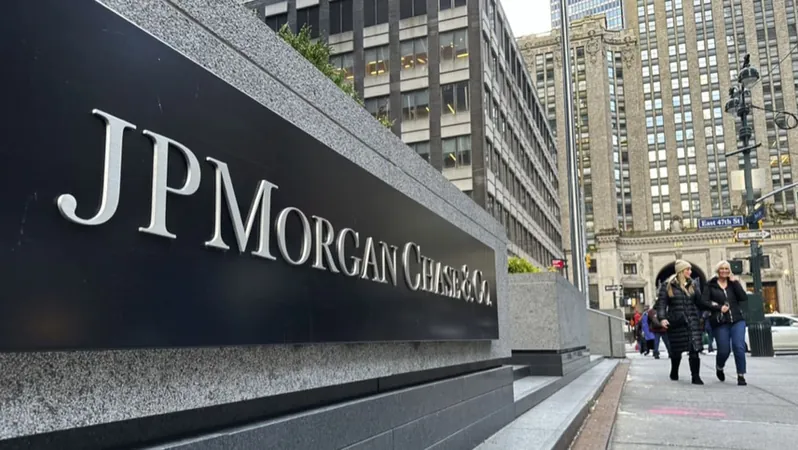
JPMorgan Chase Shatters Profit Records Amid Investment Banking Surge - What This Means for the Financial Sector!
2025-01-15
Author: Wei Ling
Unexpected Financial Triumph
In an unexpected financial triumph, JPMorgan Chase has announced a record-breaking annual profit, driven by a surge in its investment banking and trading activities during the fourth quarter. The largest bank in the United States reported this astonishing growth on Wednesday, with its annual profit soaring to $58.5 billion for 2024, marking an 18% increase year-over-year.
CEO Jamie Dimon's Insights
JPMorgan's Chief Executive Officer, Jamie Dimon, highlighted the resilience of the U.S. economy, attributing positive market trends to low unemployment rates and robust consumer spending. He stated, "Businesses are more optimistic about the economy, buoyed by expectations for a more pro-growth agenda and improved collaboration between government and business." However, Dimon remains cautious, acknowledging risks such as inflation, government spending, and ongoing geopolitical tensions.
Implications for the Financial Industry
The bank’s strong performance has important implications for the broader financial industry, which is experiencing a revival in deal-making and fundraising activities. This resurgence has been aided by the U.S. Federal Reserve's recent interest rate cuts, aimed at stimulating the economy. Notably, rival financial powerhouse Goldman Sachs reported similarly impressive profits, benefiting from a strong quarter for its investment bankers and traders.
Record Investment Banking Fees
JPMorgan's impressive financial results stemmed significantly from an astonishing 49% increase in investment banking fees and a 21% boost in trading revenue in the fourth quarter, surpassing expectations. Strong trading performances in various sectors, including credit, currencies, and emerging markets, bolstered the bank's fixed-income unit, while a resurgence in derivatives trading elevated its equities business.
Decline in Net Interest Income
Despite the overall success, the bank reported a 3% decline in net interest income (NII) in the fourth quarter, totaling $23.5 billion. This marked the first year-over-year dip in NII since 2021, as depositors increasingly demanded higher interest rates. Analysts were encouraged by the bank's overall performance. "We were most impressed with the company's big revenue beat and importantly, net interest income was quite strong," noted David Wagner, portfolio manager at Aptus Capital Advisors.
Stock Market Reaction
Meanwhile, the stock market responded favorably, with JPMorgan's shares climbing 1.8% in premarket trading. Having closed 2024 with nearly a 41% gain, the bank outperformed the benchmark S&P 500 index, showcasing investor confidence in its future trajectory.
Potential Regulatory Changes
Also influencing the financial landscape is the potential shift in regulatory policies under the anticipated return of Donald Trump's administration. Analysts speculate that easing capital requirements and smoothing merger approvals could further benefit firms like JPMorgan. Dimon emphasized the need for regulation that promotes economic growth while maintaining a secure banking system, stating, "This is not about weakening regulation but rather about establishing transparent, fair, and data-driven rules."
Succession Plans at JPMorgan
As for succession plans, attention is turning toward the future leadership of JPMorgan. Dimon assured that the bank’s succession timeline remains unaffected by Jennifer Piepszak stepping away from the CEO race; she will transition into the newly created Chief Operating Officer role. Piepszak's new position leads into the eventual retirement of Daniel Pinto, Dimon’s longtime lieutenant, in 2026.
Future of JPMorgan and the Financial Sector
Dimon, who has been at the helm of JPMorgan for nearly two decades, has noted that planning for his eventual departure is a primary focus, with a timeline of less than five years anticipated for his successor to be appointed. Notable candidates for the top position include Marianne Lake, who oversees consumer and community banking, Troy Rohrbaugh, co-head of commercial and investment banking, and Mary Erdoes, CEO of asset and wealth management.
As the financial sector gears up for new leadership and potential regulatory changes, the implications of JPMorgan’s record profits will likely reverberate across the industry for months to come. Will this remarkable success inspire other banks to innovate and adapt? Only time will tell, but one thing is clear — the future of finance looks increasingly promising!


 Brasil (PT)
Brasil (PT)
 Canada (EN)
Canada (EN)
 Chile (ES)
Chile (ES)
 Česko (CS)
Česko (CS)
 대한민국 (KO)
대한민국 (KO)
 España (ES)
España (ES)
 France (FR)
France (FR)
 Hong Kong (EN)
Hong Kong (EN)
 Italia (IT)
Italia (IT)
 日本 (JA)
日本 (JA)
 Magyarország (HU)
Magyarország (HU)
 Norge (NO)
Norge (NO)
 Polska (PL)
Polska (PL)
 Schweiz (DE)
Schweiz (DE)
 Singapore (EN)
Singapore (EN)
 Sverige (SV)
Sverige (SV)
 Suomi (FI)
Suomi (FI)
 Türkiye (TR)
Türkiye (TR)
 الإمارات العربية المتحدة (AR)
الإمارات العربية المتحدة (AR)